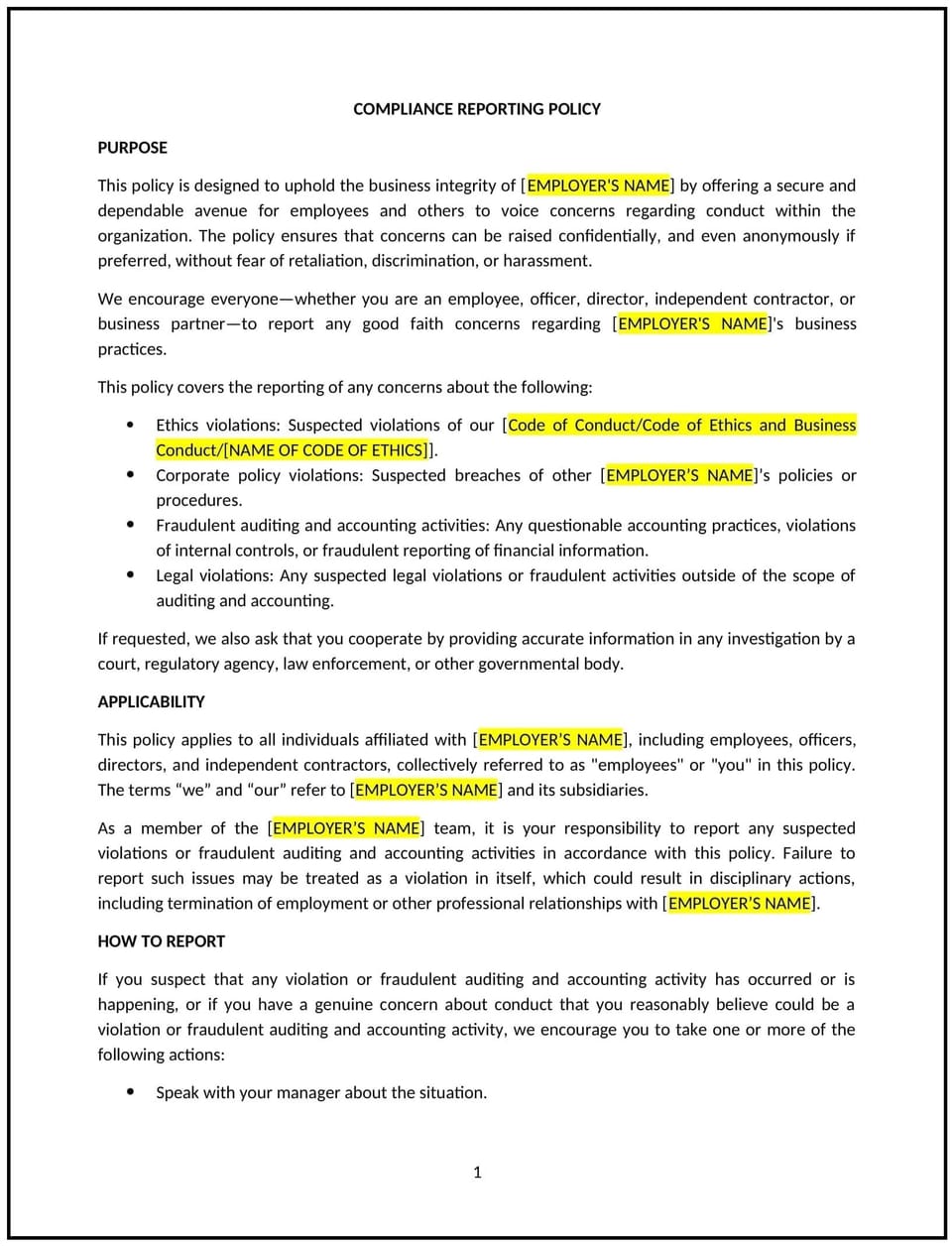Compliance reporting policy (California): Free template

Compliance reporting policy (California)
In California, a compliance reporting policy provides businesses with guidelines for employees to report concerns or violations related to workplace policies, laws, or ethical standards. This policy ensures that employees can raise issues confidentially and without fear of retaliation, supporting a culture of accountability and legal compliance.
This policy outlines the reporting process, types of issues to report, and protections for whistleblowers under California laws, including the California Whistleblower Protection Act. By implementing this policy, California businesses can promote transparency and mitigate risks associated with non-compliance.
How to use this compliance reporting policy (California)
- Define reportable issues: Specify the types of concerns employees should report, such as harassment, discrimination, safety violations, or unethical behavior.
- Establish reporting procedures: Provide clear instructions for submitting reports, including confidential channels such as hotlines or online portals.
- Protect whistleblowers: Emphasize the business’s commitment to non-retaliation and outline protections for employees who report concerns in good faith.
- Outline investigation protocols: Detail the steps the business will take to review and address reported issues, ensuring fairness and confidentiality.
- Communicate expectations: Educate employees about the importance of compliance and their role in upholding workplace standards.
Benefits of using this compliance reporting policy (California)
This policy offers several advantages for California businesses:
- Promotes transparency: Encourages employees to report concerns, fostering an open and accountable workplace culture.
- Supports compliance: Reflects California laws protecting whistleblowers and addressing workplace violations.
- Reduces risks: Helps the business identify and resolve issues before they escalate into legal or reputational problems.
- Enhances trust: Demonstrates the business’s commitment to ethical practices and employee protections.
- Improves accountability: Provides a structured process for addressing compliance-related concerns consistently.
Tips for using this compliance reporting policy (California)
- Address California-specific laws: Reflect whistleblower protections and reporting requirements outlined in state and federal regulations.
- Train employees: Educate staff on their reporting options, the protections provided, and the importance of compliance.
- Provide multiple reporting channels: Offer confidential and anonymous options to encourage employees to report concerns without fear.
- Document reports: Maintain thorough records of all reports, investigations, and outcomes to ensure transparency and accountability.
- Review regularly: Update the policy to reflect changes in California laws, business practices, or employee needs.
Q: How does this policy benefit the business?
A: This policy supports transparency, promotes compliance with California laws, and helps the business address potential issues proactively.
Q: What types of concerns should employees report under this policy?
A: Employees should report issues such as policy violations, unethical behavior, harassment, discrimination, or safety risks.
Q: How does this policy support compliance with California laws?
A: The policy aligns with California Whistleblower Protection Act requirements, supporting lawful and ethical handling of employee reports.
Q: What steps should employees take to report a concern?
A: Employees can use the confidential reporting channels provided, such as a hotline, online portal, or direct communication with HR or management.
Q: How can the business protect employees who report concerns?
A: The business can enforce non-retaliation measures, maintain confidentiality, and investigate reports fairly and promptly.
This article contains general legal information and does not contain legal advice. Cobrief is not a law firm or a substitute for an attorney or law firm. The law is complex and changes often. For legal advice, please ask a lawyer.


